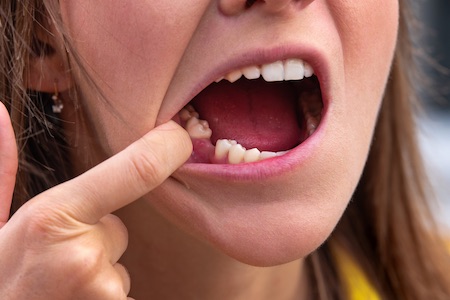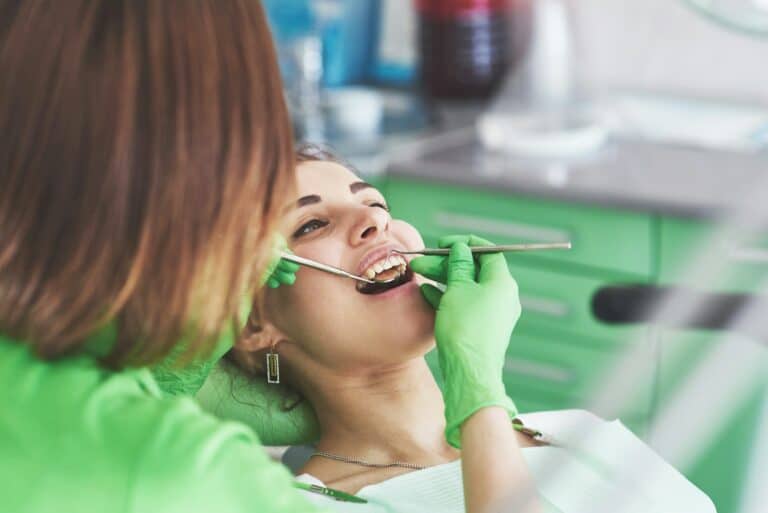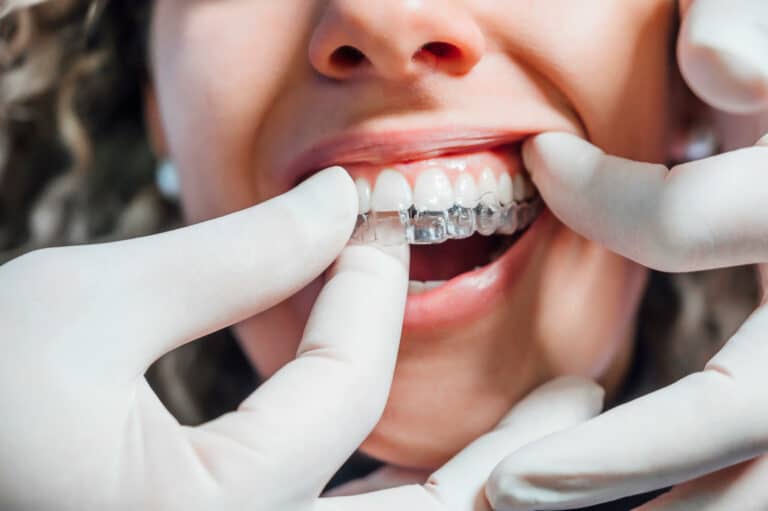 Increased confidence… Smiling every chance you get… Enjoying socializing again…
Increased confidence… Smiling every chance you get… Enjoying socializing again…
These are all things to expect when you opt for dental implants!
However, what many people fail to realize is that caring for dental implants requires a slightly different and more unique approach than caring for natural teeth.
Not only will caring for your dental implants improve your dental AND mental health…
It will ensure your dental implants reach their maximum lifespan of 20 – 30 years, giving you complete peace of mind.
That’s where we step in!
In this guide, we answer all of your questions including, how to care for your implants, how often to clean your implants (and what products to use), and more!
How Do You Carefor Dental Implants?
If an implanted tooth root comes out, it’s almost always due to gum disease (periodontitis) in the gums surrounding the implant, therefore, the best way to care for your dental implants is prioritizing oral health and visiting the dentist regularly.
Keep reading to find out exactly what post-dental implant life looks like…
How Often Do Dental Implants Need To Be Cleaned?
Similar to natural teeth, your implants must be maintained and cleaned every single day. The extent of this cleaning varies for each implant, but you’ll typically need a toothbrush, water flosser, like Waterpik.
How Do You Clean Dental Implants?
Use a Soft Nylon Brush
 Nylon brushes contain soft bristles that don’t aggravate your dental implants. You can also use a Proxabrush to clean the hard-to-reach areas around your dental implants.
Nylon brushes contain soft bristles that don’t aggravate your dental implants. You can also use a Proxabrush to clean the hard-to-reach areas around your dental implants.
Avoid hard bristle toothbrushes and instruments that scratch and irritate your implant(s).
Floss Daily
The American Dental Association recommends cleaning between your teeth daily with an interdental cleaner (like floss) – this is especially important with dental implants!
Cleaning between your teeth can help prevent cavities, remove plaque, and decrease your risk of gum disease (the main reason dental implants fail.)
If you’re not sure what to use, here are some our recommendations:
ProxySoft Bridge & Implant Cleaners
This floss is a special-use, interproximal dental cleaner that features an extra-thick and spongy brush to clean around dental implants and under bridgework.
Waterpik Cordless Advanced Water Flosser
Waterpik removes up to 99.9% of plaque from treated areas with a 3-second application, perfect for those who have difficulty using dental floss, toothpicks, or interdental brushes
What Toothpaste Is Best For Dental Implants?
Non-abrasive, tartar control toothpaste is the best option for those caring for dental implants. This ensures your toothpaste is still working to eliminate harmful bacteria without harming your implant and causing complications down the line.
Avoid toothpastes that contain excessively abrasive ingredients, such as baking soda, stain removers, and smoker’s toothpaste.
Can You Use Mouthwash With Dental Implants?
Yes and no!
For two weeks after having your implant fitted, you must rinse the area with antiseptic mouthwash morning and night. Your surgeon should recommend a specific brand or type when your implant surgery is complete.
What NOT To Do After Getting Dental Implants
DON’T Eat Crunchy/Sticky/Hard Foods
 Such as potato chips, taco shells, hard candies, caramels, acidic fruits and vegetables, or any excessively hot or spicy foods.
Such as potato chips, taco shells, hard candies, caramels, acidic fruits and vegetables, or any excessively hot or spicy foods.
Instead, stick to easy-to-chew proteins such as eggs, chicken, and fish.
DON’T Smoke or Drink Alcohol
Tobacco and nicotine cause blood vessels in the gum tissues in the mouth to constrict or narrow, increasing the likelihood that your dental implant will fail.
Excessive alcohol consumption can also impact healing time and overall success rates.
DON’T Neglect Regular Visits to the Dentist
Regular check-ups with your dentist will help pinpoint any issues with your dental implant before they become major (and potentially costly) issues.
If you’re worried about your implant or need peace of mind, schedule a check up!
How To Care For Your Dental Implant Long-Term
Once your implant has fully healed, it’s important to maintain your oral health routine to make sure you get the maximum lifespan out of your implant.
Don’t adopt the ‘fit and forget’ mindset!
Make sure you brush your teeth at least twice a day and floss regularly.
Neglected implants develop plaque and tartar and can also be susceptible to bacteria, which may result in gum disease. If left untreated, it is likely to cause soreness, bleeding, general discomfort and eventual bone loss around the implants.
We Check, Care For, & Carry Our Dental Implants
Bellavista Dental Care is the dental practice to visit if you’re looking for compassionate and efficient doctor’s who care, take pride in their work, and have acquired the highest level of accreditation in the dental industry. Call Us On [practicePhoneNumber] or Request A Virtual Consult Today!




